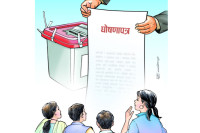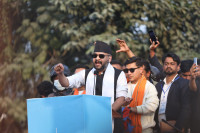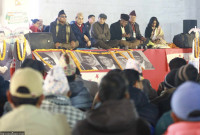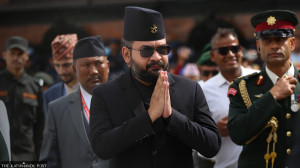Opinion
Politics and the young
The stereotypical image of youth politicians as violent goons needs to change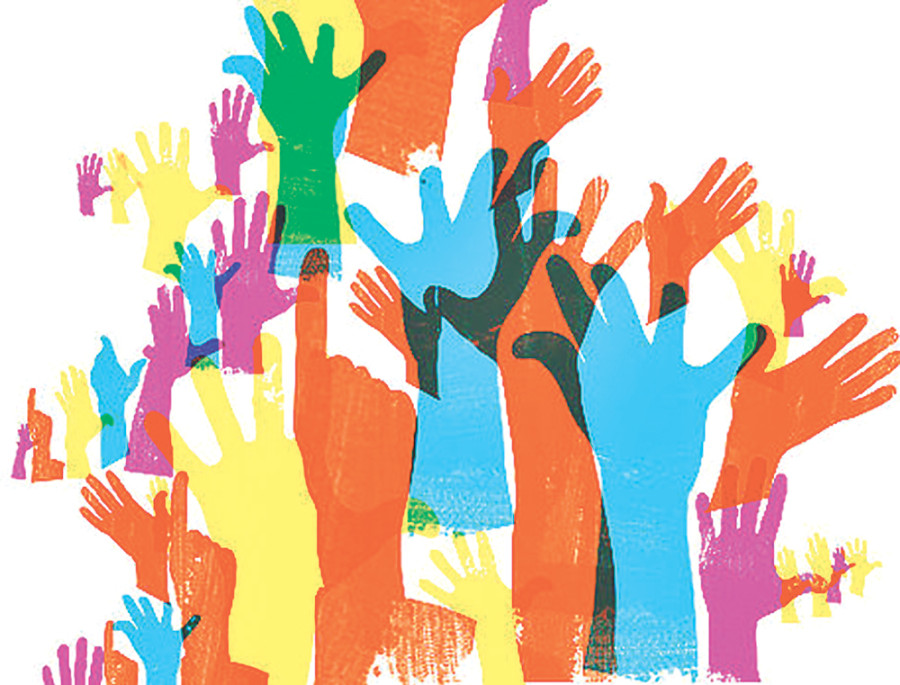
Sarin Ghimire
An overwhelming fervour has once again gripped the oldest and largest party of the country, the Nepali Congress (NC). After almost a decade-long gap, the Nepal Students’ Union, considered the nursery of future politicians and one of the most powerful sister organisations of the party, is holding its 11th general convention in the Capital. Over 3,000 representatives have arrived in Kathmandu with a sense of urgency and enthusiasm to elect their student leaders and a central working body.
Amidst the hubbub of electing their president, however, lies a striking feeling that factional politics, rather than politics of conviction and ideology, has overshadowed the jubilee. Having witnessed the deep-rooted division within the students, I was a little uncomfortable to hear NC President Sher Bahadur Deuba claim that he would sooner or later hand over the party reins to NSU leaders whom he considered as the country’s future prime ministers.
Future leaders
Students have always been instrumental in initiating and establishing major political changes in the country for the past seven decades. When the Nepali Rastriya Congress was formed under the guidance of BP Koirala and Ganeshman Singh in 1947, the spirit and devotion of students formed the backbone of its political uprising. Ever since, youths have been at the forefront of all the democratic movements in the country. The case was similar in 2006 when they poured into the streets defying state suppression, ultimately bringing the former king down to his knees.
However, although youths in the past have played a role in accordance with the political necessity of the time, the capacity and responsibility of youth leaders should now be moulded in line with the prevailing norms of the 21st century. Student unions across several nations are primarily limited to student activities in terms of education and educational institutions. But in a democratic country where youths comprise a sizable number, their voices ought to be heard. Whether it is the educational sector, socio-political issues or development practices, youths in Nepal, considering the demographic trend, are bound to have a say in every field.
Promulgating the first ever constitution endorsed by elected representatives, despite some reservations, is a major transformation for the country in terms of redefining the role of student organisations, or political forces for that matter. First off, the stereotypical image of youth politicians as violent goons need to change. Youths should be able to ideologically brainstorm on pressing reforms that the country requires in terms of development, governance, social justice, rule of law and, overall, a healthy and ethical form of politics. Only then will we be able to give birth to intellectual thinkers who would be able to handle state affairs in the future.
Sloppy generation
During a late evening discussion with one of the candidates fighting for the NSU presidency, I asked him what role he sees the student union playing in the near future. To my surprise, all he could think of was that “he would be able to gather thousands of young blood in the streets if need be.” But when I told him that I would rather be exercising my educational experience and be a student of the rapidly changing world instead of spending my time on the streets, he was quick to reply with “young, devoted and educated youths are the ones we always need.” Even though his words gave me a bit of a lift in the first instance, he exhibited some characteristics of our rather affluent senior leaders who have so successfully been deceptive with their words and actions that they have managed to control the younger generation tightly for decades.
In another closed-door chitchat, I asked one of the university presidents of the NSU, who has held his position for the past 10 years, how he managed to stay in college and muster his financial clout for the past decade without any significant source of income. He was open enough to tell me that he “does his bit of politics with whatever is donated by senior leaders.” He even glorified the fact that only youths like him with financial muscle would survive in present day politics, and that several others with whom he began his political journey a decade ago have opted for what he called a life away from active politics and into professional jobs to sustain themselves.
The NSU has, without a doubt, produced some of the most senior leaders the mother party has in present day. Deuba, a three-time prime minister, himself was once the president of the student wing; Ram Chandra Poudel was its founding member and our current Home Minister Bimalendra Nidhi, too, once led the NSU. A majority of the former NSU presidents are now central committee members of the NC. However, it is time for us to ask ourselves what kind of leaders we want in our generation. Unless we readjust student unions as per the demands of a fast-growing society, the deeply engraved hierarchical structure within the party will never allow them to flourish independently. Yes, these students during the NSU’s conclave are understanding the frameworks of a working democracy, but do they realise that their raw talent and energy are not being translated into the traits of future leaders or, in fact, prime ministers?
Ghimire is with the political desk at The Kathmandu Post




 14.12°C Kathmandu
14.12°C Kathmandu

